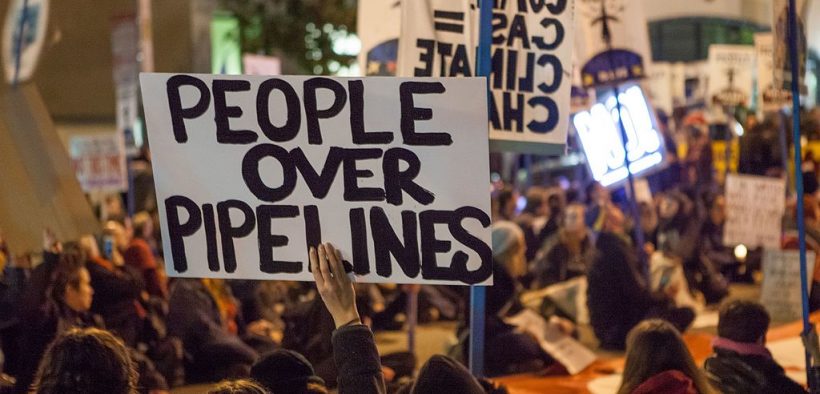Pipeline Protests Shut Down Rail Services in Canada

“Indigenous people see what’s happening to us and see what’s happening to our territory and our pristine waters – and to our people on the ground, having semiautomatic weapons aimed at us. People are responding to that in appropriate ways.”
In an escalation of public disobedience, protesters demonstrating against a proposed natural gas pipeline have halted cross-continent rail lines and disrupted commercial and passenger travel.
Canada’s biggest railroad operator, Canadian National Railway Co, shut down its services in Eastern Canada in response to the protests.
The Wetʼsuwetʼen First Nations tribe is at the heart of the matter, and last week the Royal Canadian Mounted Police (RCMP) arrested 28 protestors on Wetʼsuwetʼen land. Several indigenous tribes have contested the construction of a nearly $5 billion, 400-mile Coastal GasLink pipeline that would cut through sacred tribal land.
Appearing on Democracy Now, Wet’suwet’en spokesperson Molly Wickham said, “the conflict that has been going on around this pipeline has been going on for years. This isn’t something new. Last year, on January 7th, we were also raided by heavily militarized RCMP.”
Despite previous incursions from the RCMP onto indigenous land to arrest protestors, Canadian Prime Minister Justin Trudeau dismissed the idea that he would send in the RCMP to break up the protests.
“Obviously we are not the kind of country where politicians get to tell the police what to do in operational matters,” commented Trudeau while on a diplomatic trip in Germany.
To address the rail closures and growing protests, the prime minister’s office announced on Sunday that it would cancel a planned trip to Barbados.
Economic Impact
The Canadian government and business leaders have framed the disruptions as a massive negative influence on the country’s overall economy, arguing essential goods will not reach their destination.
“It is about people’s jobs and livelihoods and about the transport of key supplies like food, propane, heating oil and chemicals for water treatment, (and) agricultural products for export,” Transport Minister Marc Garneau said at a press conference.
The widespread closures have been aided by actions of solidarity from other indigenous groups and activists throughout Canada.
Leader of the opposition Conservative Party, Andrew Scheer, warned that without a response the protests would “be setting a dangerous precedent that a small few can have a devastating impact.”
Not only has the Canadian National Railway shut down Eastern Canadian operations, but VIA rail canceled passenger services as well.
However, the protestors argue their response is measured. Molly Wickham said, “indigenous people see what’s happening to us and see what’s happening to our territory and our pristine waters – and to our people on the ground, having semiautomatic weapons aimed at us. People are responding to that in appropriate ways.”
More Than Just A Pipeline
For indigenous groups and activists, the protests are about much more than just one pipeline. Protestors have repeatedly mentioned their sovereignty and Canada’s sordid past in handling First Nations people.
Professor and lawyer Pamela Palmater said, “it’s often categorized as an anti-pipeline protest, but I don’t think that’s accurate. It is for some, but for most of us it’s about protecting our indigenous sovereignty and our land rights.”
Disputes between the Canadian government and First Nations have been a regular feature of modern Canadian politics. The Oka Crisis in 1990 between the Mohawk people and Oka, Quebec lasted 78 days. In more recent memory, the Dakota Access Pipeline protests resulted in nearly 500 arrests throughout the 10-month standoff in 2016-2017.
Prime Minister Trudeau has attempted to make concessions to the First Nations, in May 2019 a government report referred to government state actions directly led to a ‘genocide’ against indigenous women.
However, Trudeau’s coziness with the oil and gas industry and the RCMP’s militarized actions have left a sour taste in many indigenous people’s mouths.
“This is about asserting Indigenous rights, asserting Indigenous sovereignty, to remind the government that they have a legal responsibility to us,” protest organizer Sean Vanderklis told CTV.











